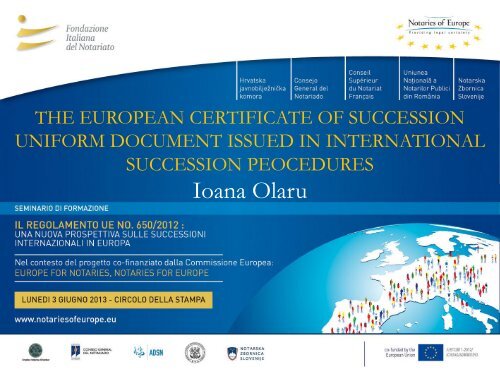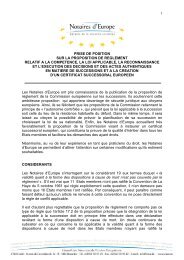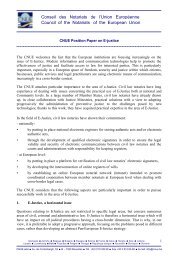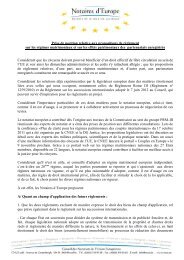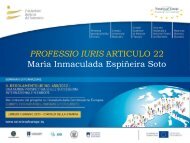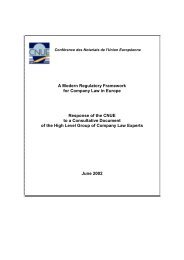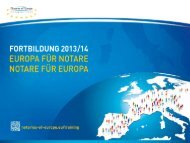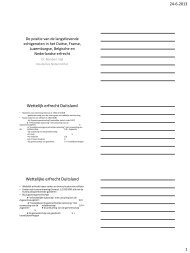Ms Ioana Olaru Presentation - English
Ms Ioana Olaru Presentation - English
Ms Ioana Olaru Presentation - English
You also want an ePaper? Increase the reach of your titles
YUMPU automatically turns print PDFs into web optimized ePapers that Google loves.
THE EUROPEAN CERTIFICATE OF SUCCESSIONUNIFORM DOCUMENT ISSUED IN INTERNATIONALSUCCESSION PEOCEDURES<strong>Ioana</strong> <strong>Olaru</strong>
The European Certificate of Succession –Uniform Document Issued in InternationalSuccession Procedures<strong>Ioana</strong> <strong>Olaru</strong>NotaryBucharest-Romania
How is an international succession currently settled ?Case study:The deceased was a Romanian citizen with his last habitual residence in Italy.He owned both movable and immovable assets, both in Italy and Romania and he had notleft a will.Solution 1 : a Romanian notary will apply the Romanian law (following his own rule of conflictand renvoi) and shall issue a Certificate of Succession = property title and provides for the inheritors andfor their rights on the assetsSolution 2 : an Italian notary will aply the Italian law (following his own rule of conflict andrenvoi)• For the immovable assets in Romania, the Italian notary is not competent,because Art. 24 of Law no. 7/1996 concerning the land register and real-estate publicity only allows theinscription in the Land Register of documents issued by the Romanian authorities• The circulation of documents issued in succession procedures in the memberstates is not regulated, because Regulation (CE) No. 44/2001 excludes successions from its scope(Art.1 paragraph 2a). For example, under the Romanian law, this is done through a court decision issuedaccording to the provisions of the new Code of Civil Procedure.
What Is and What Isn’t the European Certificate of Succession?Art.62, Art.63 and Recital (67) of Regulation (EU) No. 650/2012.• It is a uniform “document” with value ofproof, meant to be used by inheritors,legatees, executors of wills or administratorsof estates in order to prove more easily theirstatus, rights or competencies in anothermember state than the one in which thecertificate was issued• It benefits from direct circulation, as noformality is needed for its recognition in thedestination state.• The Certificate shall be presumed toaccurately demonstrate elements whichhave been established under the lawapplicable to the succession or under anyother law applicable to specific elements• ECS is a streamlined “form” and does notreflect the definitive solution of asuccession with cross-border implications• ECS is not an authentic act, neither acourt decision, nor a judicial transaction, inthe sense of the definition of those termsgiven in Art. 3, paragraph 1 letter i, g and hof the Regulation• It is not a mandatory document, it doesnot replace national documents but at thesame time it can also be used on theterritory of the issuing state.• It is not an enforcement title in aninternational succession
The Authorities of which state have jurisdiction to issue the Certificate?• Jurisdiction rules are more restrictive• A notary may settle an inheritance with cross-border implications without obeying any jurisdictionrule (except for cases when the notary exercises judicial functions, as provided in Recital (22) )• When issuing an ECS, the notary shall obey the jurisdiction rules as provided by Art. 64 ofthe Regulation.• It is possible to conclude a choice of forum agreement only if the deceased had chosen theapplicable law and the parties recognize or accept that jurisdiction• General rule:jurisdiction lies with the authority from the state of habitual residence of thedeceased• If the deceased had made a choice on the law applicable to his/her succession, theauthorities of the chosen state do have jurisdiction with certain conditions• In subsidiary, jurisdiction can also be granted to the courts/authorities at the location of theassets• Jurisdiction conferred by forum necessitatis
The ECS Issuing Procedure• Formulating a request by the interested party. The circle of “applicants” is strictly determinedin Art. 63 paragraph 1. In order to make the request, the applicant will use a form.• Mandatory: the presentation of the death certificate• Verification of information provided in the application.• Verification of its own territorial jurisdiction by applying Art. 4, Art. 7, Art. 10 or Art. 11 ofthe Regulation• Verification that a similar request has not been lodged concerning the same deceased personin the Member States• Entering the application in the registers of the competent authorities and in the EuropeanRegister, and the creation of a file of the succession case• Obtaining the necessary proof meant to clarify aspects that are requested to be certified.• Informing beneficiaries or potential beneficiaries by public annunciations.• Obtaining the consent of the beneficiaries, involved/interested parties with regard to theelements submitted to certification and the very fact of issuing the ECS.• The Issuing and Content of the ECS – Art. 67 and Art.68 of the Regulation
Is the ECS “valid” title for the entering of the property right intoland registers? Which are the effects the ECS will produce?• For example: Will the inheritors of an immovable asset located in Romania be able to sell it basedon an ECS issued in Italy?• ECS creates the assumption of verity of the elements it contains, therefore it has probatory value, but itlacks enforcement power.• Art. 69 declares it to be “valid title for inscribing the succession assets in the correspondingregister of a member state.”• The person inscribed as beneficiary is presumed to have the quality of legalinheritor/legatee/administrator/executor of will. Any person entering into a contract with theinheritors is right to have faith in their quality and to acquire assets from or to transfer assets ormoney to those inheritors.• In spite of that, the scope of the Regulation (Article 2 letter k and l) excludes both the nature ofreal rights and the notations into a register of property rights on movable or immovable assets,including the legal requirements for such a notation, as well as the effects of the notation or lackof a notation of such rights into a register.
The Need for a Single Record of International Successionsand European Certificates of Succession• Given that ECSs do not circulate in original form, but only in copies valid for only six months, itwould be useful for this record to mention the number of copies issued and their expiration date.• On the other hand, since the ECS is not a final document, it is subject to corrections,modifications or withdrawal. All those situations have impact on the probatory value of thecertificate and must be notified to the persons who might believe in the data contained in thecertificate. This is done according to the Regulation by the obligation of the issuing authorityto inform those to whom copies have been issued of the appearance of a case ofrectification, withdrawal or modification.• In addition to holders of copies of the certificate, the interest in verifying the reality of the datacontained in the ECS also lies with other beneficiaries or persons about to enter in contractrelations with the persons inscribed in the ECS
Thank you for your attention!


